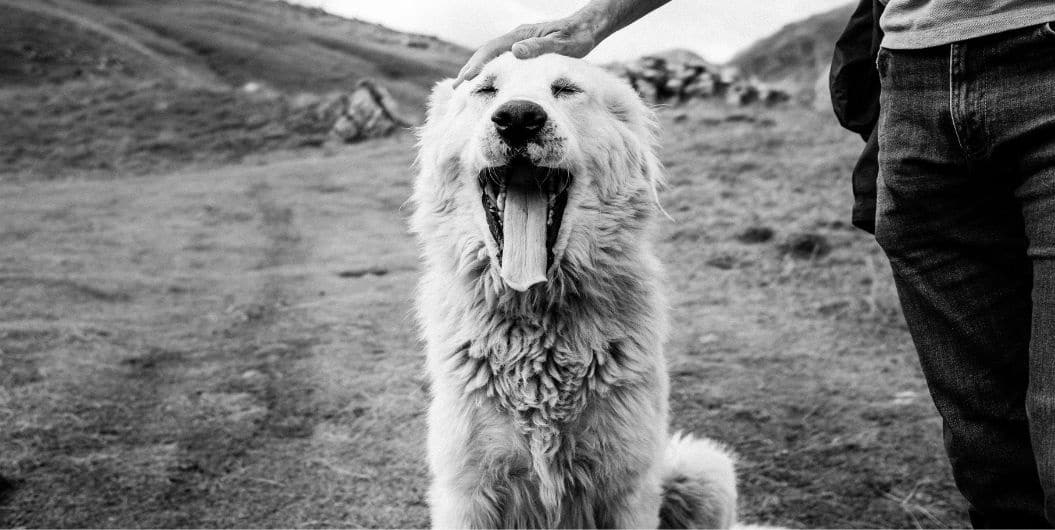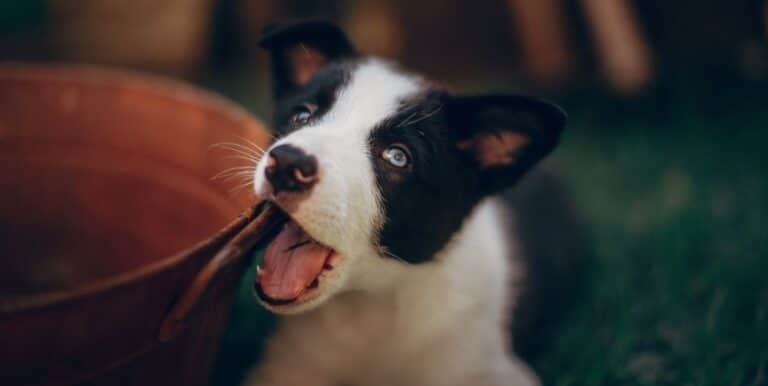How Safe Is Cottage Cheese for Dogs?

Cottage cheese for dogs is a safe option as part of a bland diet to combat diarrhea. Typically, a bland diet could include a mix of low-fat meat with cottage cheese or certain other bland foods. Many experts also approve of cottage cheese for dogs as an occasional treat or additive for dry food when used in moderation. Although some dogs are lactose intolerant and therefore cannot tolerate dairy products, cottage cheese contains smaller amounts of lactose than some other dairy products. Some sources recommend using low-fat and low-sodium cottage cheese for dogs, and others advise squeezing out the excess liquid before serving.
Many owners use cottage cheese for dogs as part of a temporary bland diet to treat acute diarrhea or stomach upset. Cottage cheese can provide protein, phosphorus, and calcium in addition to settling the dog’s gastrointestinal system. After withholding food entirely for up to one day while providing small amounts of water to prevent dehydration, small amounts of a bland diet mixture can be introduced. Gradually, the bland food mixture can be replaced by the dog’s normal diet.

Bland food including cottage cheese for dogs can feature low-fat meat, such as cooked chicken or boiled hamburger, cooked oatmeal, white rice, or boiled potato. For small breeds, human baby food in the form of pureed chicken can substitute for cooked chicken or hamburger. A few tablespoons of plain yogurt or boiled sweet potato can be added for additional digestive soothing.
A diet of bland food is an appropriate response to acute diarrhea in dogs who are exhibiting a normal activity level. A dog who displays diarrhea along with lethargy, blood in the stool, or repeated vomiting could be seriously ill and should be taken to the vet immediately. Owners who notice chronic or recurring diarrhea in their dogs should also have these animals examined by a veterinarian. A bloated or distended stomach, difficulty breathing, retching, and obvious pain or discomfort in the abdomen are signs of gastric dilation and torsion, an emergency condition that can result in death if not treated quickly.
Another common gastrointestinal ailment in dogs is constipation, in which the dog has difficulty passing stools or produces stools that are small and hard. Adding cooked vegetables to the dog’s diet in moderation can aid this condition. In addition, frequent exercise and sufficient hydration are key to dealing with constipation. Over-the-counter laxatives could be harmful and should not be given to dogs.
Can Dogs Eat Cottage Cheese for Upset Stomach?
Giving human food to dogs can be a tricky business. Some are perfectly safe, while others are not. Sometimes, the food itself can be toxic. For instance, dogs cannot eat any plants from the alum family, including garlic, leeks, shallots, onions and chives. These plants contain N-propyl disulfide, a compound that breaks down red blood cells in dogs. This results in hemolytic anemia, a serious condition that can result in death if untreated.
Although raw foods themselves may not be toxic to dogs, they may become unsafe after being processed for human consumption. Peanut butter is a notable example. Some versions contain xylitol, an artificial sweetener often used in low-sugar or sugar-free foods. Xylitol consumption can lead to dangerously low blood sugar, liver failure, seizures and even death. Cottage cheese on its own is safe, but you should take steps to ensure it doesn’t add too much sodium to your dog’s diet.
Safe Sodium Intake Levels for Dogs
When giving people food to dogs, you should pay attention to the sodium content. Dogs do need some salt in their diets, but determining that amount can be a bit challenging. After all, most types of dog food already contain some sodium. Prepackaged human foods usually contain some sodium — for instance, a 1/2 cup serving of regular cottage cheese can contain up to 500 milligrams.
Guidelines for dogs’ salt intake can be a bit confusing. Some sources recommend that your canine friend consume no more than 100 milligrams per day for every 100 calories eaten. Other standards use a dog’s weight as a guideline. The National Research Council set a maximum sodium intake of 13.3 milligrams for every kilogram of body weight.
So if we use weight to determine safe sodium intake, how much is too much? For a full-grown Great Dane weighing 55 kilograms, the NRC would recommend no more than 731.5 milligrams. A 5-pound Chihuahua should eat a maximum of 66.5 milligrams each day. By comparison, the American Heart Association suggests that humans consume no more than 2,300 milligrams daily.
Cottage Cheese and Stomach Relief
Low-sodium cottage cheese is both safe and helpful for a dog with GI discomfort. On average, low-sodium varieties contain less than half the salt of regular cottage cheese — about 220 milligrams per 1/2 cup. Besides protein, calcium and phosphorus, some brands of low-sodium cottage cheese also contain vitamin A and potassium. When buying it for your pooch, check the label to make sure it has live probiotic cultures. These can aid your dog’s digestive system.
How Much Cottage Cheese Can You Give a Dog?
Dogs can safely eat cottage cheese, particularly the low-sodium variety. But how much should you give them? The average serving size for a human is 1/2 cup, about four ounces. In comparison, cottage cheese should normally constitute only 10% of the l your dog’s daily food intake. That works out to a couple of spoonfuls for a medium-sized dog.
If you’re feeding your canine friend a bland diet for stomach issues, you can probably give a little more cottage cheese. However, you should consult your veterinarian first. In some cases, cottage cheese can aggravate stomach issues. This is especially true for lactose-intolerant dogs. Also, avoid feeding cottage cheese to dogs that are overweight, those with pancreatitis or large-breed puppies.
What Does Cottage Cheese Do for Dogs?
As mentioned earlier, cottage cheese is a type of bland food. It also tends to be lower in fat than other varieties of cheese. And while it does contain some lactose, it’s not as much as you may find in other dairy foods. The fermentation process removes a lot of the lactose in the original product: Lactic acid bacteria metabolize lactose, converting it into lactic acid. That’s why most cottage cheese has a slightly acidic flavor. Lactic acid helps control some harmful microorganisms, which is why it’s added to many kinds of pet food.
Due to its bland nature, cottage cheese can be part of your dog’s diet when recovering from stomach upset. When you serve it to your dog, you should mix it in equal parts with other bland foods. Try combining it with boiled potatoes, cooked oatmeal or white rice. This mixture should be easy for your pup to eat and digest. Before blending cottage cheese with anything else, drain and squeeze the excess liquid out of the container.






